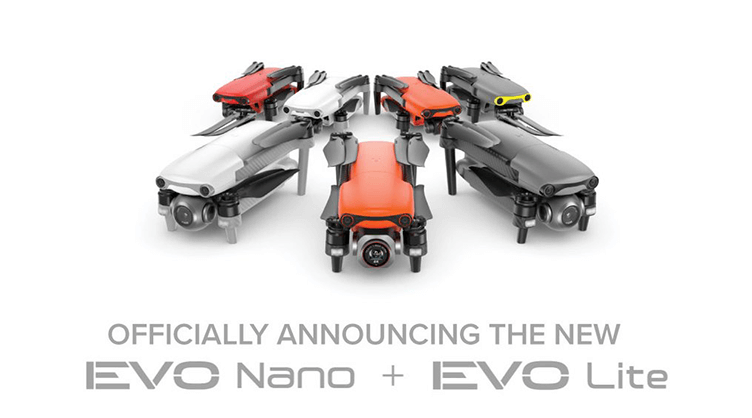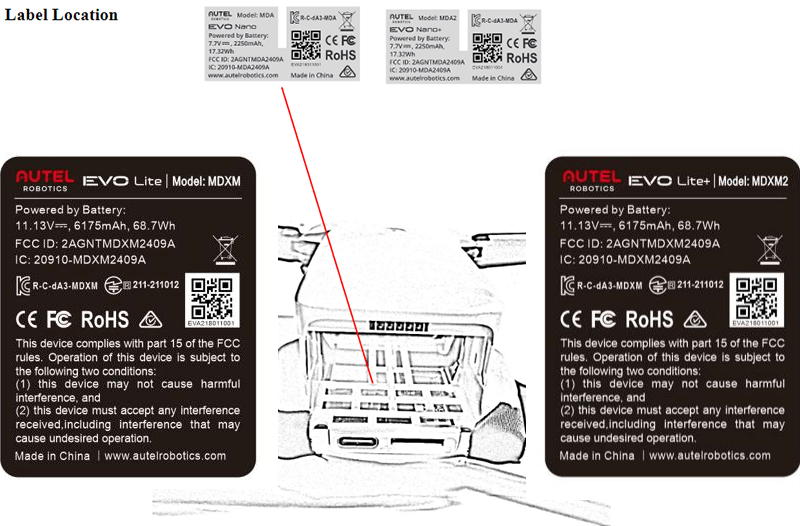Since we first reported on the upcoming AUTEL EVO Lite and Nano drones, the company has been making big changes. New senior management, drone gurus, and most recently a new PR firm.
AUTEL’s EVO II series was released in the lead up to CES2020 in Las Vegas, and attracted a ton of attention. With better camera options, swappable gimbals and superior battery life the EVO II Series should have been a bigger blow to DJI’s dominance. You can blame that on marketing. From a marketing perspective, AUTEL has been the “Blackberry” of drone makers: kick product out the door without promotion or support.
Related: Autel Releases 249gram EVO Nano, 6K Lite Drones
We’ve reached out to AUTEL multiple times over the last two years on a variety of topics for articles that could have been supportive of their products to our extensive, global, readership. All we heard in response was crickets.
But that appears to be changing. Prior to today’s release of the FCC applications for the EVO Lite and Nanodrones, we received an email from AUTEL’s new PR firm. This is the first time Autel has reached out to us over the last 7 years we’ve been reporting on drones.

New Drones Coming January-ish
The first thing we can share is that the new drones will be showcased at CES2022 in Las Vegas, exactly 2 years from the release of the EVO II Series. After that, we expect to have test versions in our hands in January or February.
What the FCC Applications Tell Us
EVO Nano, the smaller of the new drones features a rear-entry battery arrangement similar to the DJI Mavic Mini and Mini 2.
The EVO Nano is powered by a 2250 mAh LiPo battery with 17.32 watt-hours of juice, exactly the same as the DJI Mini 2. So we expect the EVO Nano to have at least the same 31 minute flight time as the Mini 2.
Available in two flavors, Nano and Nano+, users will be able to chose between models with different cameras and prices. Nano+ features a 1/1.28″ CMOS sensor capable of 50MP stills and 4K video(3840×2160) at 24/25/30 fps.
Nano features a 1/2″ CMOS sensor, 48MP stills and 4K video(3840×2160) at 24/25/30 fps with a 100Mbps write speed for both Nano/Nano+.
Both Nano models also feature 16x digital zoom.
3-Direction Vision Sensors
Unlike the DJI Mini 2, which only has downward vision sensors, the Nano/Nano+ series of Autel drones features 3 direction obstacle avoidance with forward, rear and downward sensors. That’s a huge plus over the Mini 2.
Both Nano models weigh in at 249 grams, ideal for the traveler or unlicensed hobbyist operating where restrictions exist.
EVO Lite Series
EVO Lite, designed to compete with the DJI Air 2 Series also appeared in the FCC database today. From the application we know EVO Lite featuers a 6175 mAh battery with 40 minutes of flight time, 30% more than the DJI Air 2S.
Like the Nano Series, EVO Lite features two models with two different cameras. EVO Lite comes with 1/1.28″ CMOS sensor sporting 50 megapixels and 4K video at 24/25/30/48/50/60 fps. EVO Lite+ has a 1″ sensor, with 20MP, capable of grabbing 5.4K video at 24/25/30 fps.
Write speed is 120Mbps for both Lite and Lite+ models, less than the 150 Mpbs in the DJI Air 2S.
EVO Lite+ also has 16x digital zoom, 1.3x lossless at 4K and 3x lossless at 1080p.
We’re excited that AUTEL has reached this milestone with their FCC applications, and it means we’re one step closer to getting these new drones for testing.
DJI continues to face headwinds from US trade and security agencies that most recently added DJI to another black-list of Chinese companies, according to the Financial Times.
Be sure to subscribe to our newsletter, and click OK for notifications to be the first to know what’s next for the AUTEL Evo Lite and Nano drones.



